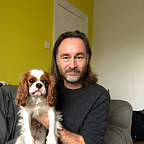Release the humans
Fundraising, engagement and human flourishing
Alfred Sloan was the CEO of General Motors, and invented modern management, with its complex system of divisions, departments and hierarchies, accounting and decision-making. He introduced common business measures like Return on Investment and ideas like product portfolios and planned obsolescence. He in turn was influenced by the time-and-motion ethos of Frederick Wilmslow Taylor, who had transformed modern manufacturing by turning complex industrial processes into smaller and smaller tasks, each performed repetitively by low-paid workers.
Either of these two rather cold and rational men, would recognise the organisational structures of even the UK’s most progressive charities. They are the reason why you are an Acquisition Manager, a Head of Retention, a Legacy Officer, a Community Fundraising Assistant or, yes, a Director of Fundraising (or Engagement or Income Generation or Supporter Experience). They are the reason why there’s an organogram on a powerpoint slide that has a box with your name in it. They are the reason why some days, despite the fact that you probably got into working for charities because you wanted to change the world, you wonder what you’re actually doing. And whether you could be doing something else. Something that would make a bigger difference.
The way fundraising is structured aims to maximise efficiency, just as these two men aimed to maximise efficiency in the manufacture of paint, wire, light bulbs or cars. This is why your role has been reduced to one of a specialist whose task is to reproduce, again and again, the best possible way of doing something to maximise return on investment. Not a headlight or a fuel injection pump but a campaign, a mailpack, a DRTV commercial, a mass participation event, an innovation programme, a welcome pack. Again and again. At the expense of all the other things you could be doing (or could have done with your life).
As Alain de Boton, writing for the School of Life, points out “one of the greatest sorrows of work stems from a sense that only a small portion of our talents has been taken up and engaged by the job we have signed up to do every day. We are likely to be so much more than our labour allows us to be. The title on our business card is only one of the titles we theoretically possess.”
So what if things were different?
There’s a reason why you may often feel like a cog in a fundraising machine designed for optimisation. Media like TV, direct mail, OOH, telephone and face-to-face demand this, because they’re expensive. When you’re making a 60-second DRTV ad there is no room for brand-building, engagement, supporter experience or anything that will get in the way of driving a response. Every word, frame and second counts, because it costs so much to make and air. Its job — and yours — is to minimise cost and maximise return.
But the media landscape doesn’t look like it used to. With digital and social media and an expanded role for PR, we can add owned and earned channels alongside the paid ones. We can take advantage of the interaction of channels, complex and hard to measure though it might be. And we can imagine people as a channel too, people who will talk and share and interact rather than just receive.
And that means we can tell different stories. We can start imagining our causes as ways to change the world rather than assets to monetise.
We can think differently about people too. The Bechdel Test requires that works of fiction feature at least two women who talk about something that isn’t a man. In other words, that female characters have lives and backstories and realities. New stories mean we can start to apply that thinking to our ‘case studies’, our ‘clients’, ‘beneficiaries’ and our ‘supporters’. We can start treating them as though they were real people.
And we can start to become real people ourselves.
Release the humans
My view is that engagement, for want of a better word, isn’t just a more palatable word for acquisition, but an opportunity to prize human flourishing. It’s an opportunity for us, as agents of change, to bring more of our selves to work. To think beyond the optimised formulas of fundraising and access our empathy, our ingenuity, our humanity.
The requirement to collaborate across teams and functions gives us an opportunity to tear down our cubicles and tear up our business cards. Fundraisers can help to evolve programmes. Policy experts can drive innovation. We can use engagement as a trojan horse to challenge the silos that have made so many of our organisations so slow to change.
And it’s an opportunity for the people we currently call ‘donors’ or ‘supporters’ to be so much more too. Engagement might allow these people to become volunteers, partners, investors, co-owners, advocates, neighbours, participants — and more. It might allow us all to break out of the narrow structures we’ve created around ourselves and be who we were meant to be.
A reviewer of Sloan’s memoir My Years with General Motors noted “not once does Sloan make reference to any other values. Freedom, equality, humanism, stability, community, tradition, religion, patriotism, family, love, virtue, nature — all are ignored… His language is as calculating as that of the engineer-of-old working with calipers and slide rule, as cold as the steel he caused to be bent to form cars: economizing, utility, facts, objectivity, systems, rationality, maximizing — that is the stuff of his vocabulary.”
We might not recognise it, but that’s the stuff of our vocabulary too.
General Motors declared bankruptcy in 2009.
